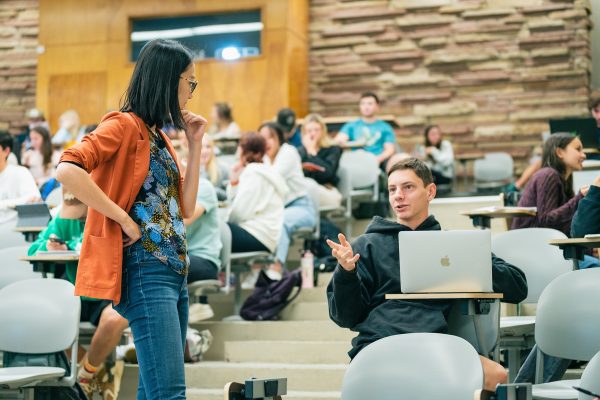
We all remember our first job. Growing up on the family farm, I was expected to help out with animals, crops, and garden. For spending money, I’d volunteer to help the neighbors with similar work on their farms. My first “real” job in the city, one that I had to apply for and received a regular hourly wage, was during the vacations in my undergraduate years at a men’s store in my hometown. In that job I learned the importance of customer service, how to judge sizes through vague descriptions (“he’s about your size, though taller and heavier”), and how to match colors.
Though I still rely on some of those skills (patience is always important; I still fold sweaters and dress shirts the way the proprietor taught me), that job and several others I had during those years seemed to have little to do with what I was learning in my classes as an undergraduate. Today, in the College of Liberal Arts we seek to better connect the knowledge developed in our various disciplines with career experiences and opportunities students gain through internships.
An internship, as defined by the National Association of Colleges and Employers (NACE) is “a form of experiential learning that integrates knowledge and theory learned in the classroom with practical application and skills development in a professional setting.” For students in the College of Liberal Arts, internships provide an opportunity to apply the skills learned in the classroom, to explore career options, and often to make a real difference for the community or businesses they serve.
Internships are important to the students and the organizations that host them, and they are a vital part of our educational mission. The foundational document for CSU as a land-grant university is the Morrill Act of 1862 whose general statement of purpose is “to promote the liberal and practical education of the industrial classes in the several pursuits and professions of life.” Seen in this light, internships are one way that we promote a complementarity of a liberal arts education, that we teach our students to both think and do. As the 21st century progresses, both forms of knowledge are as important as ever, both to individuals and to society. There are few, if any, careers safe from changes in culture or the disruptive aspects of technology. The merely “practical” is no longer practical enough for an economy in which more jobs every day require and reward flexibility and critical thinking. Just as careers are more fluid than fixed, so too must be the education we provide at CSU and in the liberal arts.
As you will see in the articles that follow, internship sponsors work carefully and intentionally with faculty, staff, and the students to develop educational opportunities inherit in the internships. Internships must advance the needs of the employer, extend knowledge from a field of study, and develop skills transferable to other career contexts.

From the stories of these students – and many more – we know that the liberal arts provide students with relevant, practical, and real-world skills they can apply to the many needs of our community and organizations.
Sincerely,

Benjamin C. Withers, Dean
Professor of Art History
College of Liberal Arts
